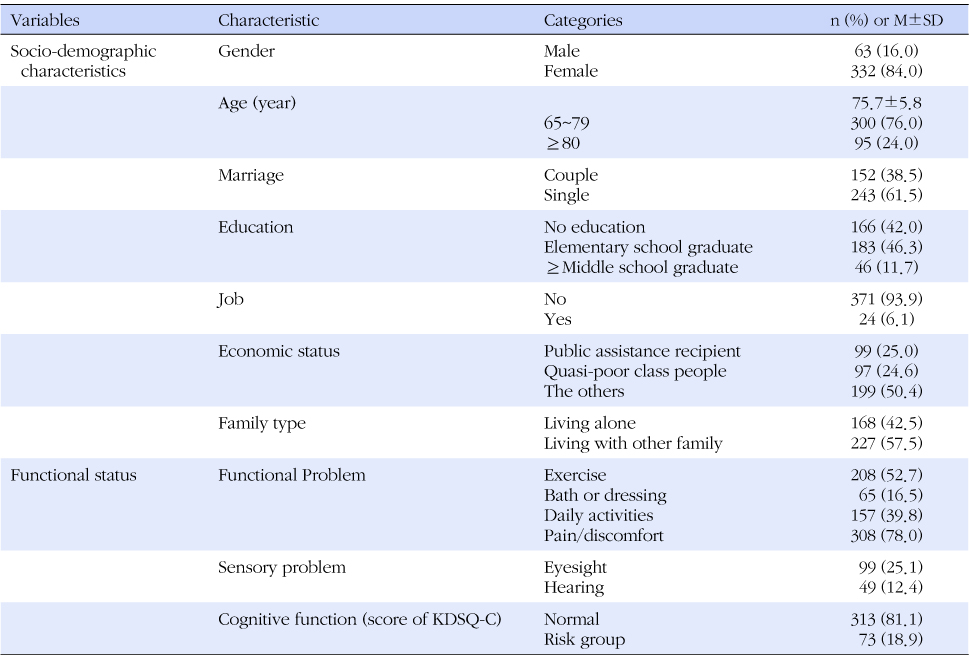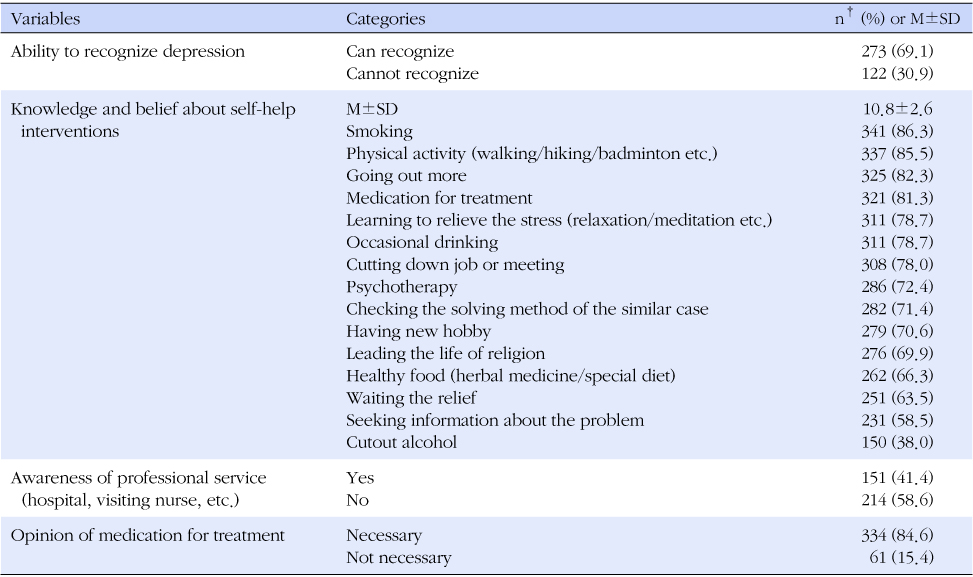Articles
- Page Path
- HOME > J Korean Acad Community Health Nurs > Volume 23(3); 2012 > Article
-
Original Article
- Depression Health Literacy and Help-seeking Intention of the Aged Receiving Customized Home Visiting Health Care Services
- Doo-Nam Oh, Ji Yun Lee
-
Journal of Korean Academy of Community Health Nursing 2012;23(3):276-285.
DOI: https://doi.org/10.12799/jkachn.2012.23.3.276
Published online: September 30, 2012
1Department of Nursing · The Research Institute for Basic Science, Hoseo University, Asan, Korea.
2Department of Nursing, Kangwon National University, Chuncheon, Korea.
• Received: April 17, 2012 • Accepted: September 7, 2012
Copyright © 2012 Korean Academy of Community Health Nursing
- 620 Views
- 2 Download
- 1 Crossref
Abstract
-
Purpose
- The purpose of this study was to understand levels of both mental health literacy of depression and intention of help-seeking, and then to identify the relationship of them in Korean older adults.
-
Methods
- Participants in this cross-sectional survey were 395 persons over 65 years old receiving customized home visiting health care services at Chungnam province. Data were collected through interviews by visiting nurses in 2011.
-
Results
- The proportion of participants with depression was 61.8% (6.7±3.6). 78.2% of subjects appeared to have help-seeking intention for solving depression. The proportions of participants with ability to recognize depression was 69.1%. Although the level about knowledge and belief in self-help interventions were varied according to questionnaires, subjects understood self-help intervention of smoking accurately (86.3%) and physical activity (85.5%). Ability to recognize depression, knowledge and belief about self-help managements, and opinion of medication for treatment among health literacy variables measured in this study were related to help-seeking intention. In addition, women, visual impairment, and lower depression scores were related to help-seeking intention.
-
Conclusion
- Results demonstrate that it is necessary to improve depression health literacy to manage effectively depression of vulnerable elderly in communities. These results could be used in developing mental health literacy programs.
- 1. Bijl RV, Ravelli A. Psychiatric morbidity, service use, and need for care in the general population: Results of the Netherlands mental health survey and incidence study. Am J Public Health 2000;90(4):602–607.
- 2. Cotton SM, Wright A, Harris MG, Jorm AF, McGorry PD. Influence of gender on mental health literacy in young Australians. Aust N Z J Psychiatry 2006;40(9):790–796.
- 3. Farrer L, Leach L, Griffiths KM, Christensen H, Jorm AF. Age differences in mental health literacy. BMC Public Health 2008;8:125.
- 4. Fisher DH, Goldney RD. Differences in community mental health literacy in older and younger Australians. Int J Geriatr Psychiatry 2003;18:33–40.
- 5. Francis C, Pirkis JE, Dunt D, Blood RW, Davis C. Improving mental health literacy: A review of the literature 2002;Center for Health Program Evaluation Melbourne: Center for Health Program Evaluation, University of Melbourne.
- 6. Griffiths KM, Christensen H, Jorm AF. Mental health literacy as a function of remoteness of residence: An Australian national study. BMC Public Health 2009;9:92.
- 7. Im MY, Ha NS. A study on health service utilization it's determinants in the low income family in Korea. J Korean Community Nurs 2002;13(2):272–279.
- 8. Jang Y, Kim G, Hansen L, Chiriboga DA. Attitude of older Korean American toward mental health services. J Am Geriatr Soc 2007;55(4):616–620. http://dx.doi.org/10.1111/j.1532-5415.2007.01125.x
- 9. Jorm AF. Mental health literacy: Public knowledge and beliefs about mental disorders. Br J Psychiatry 2000;177:396–401.
- 10. Jorm AF, Nakane Y, Christensen H, Yoshioka K, Griffiths KM, Wata Y. Public beliefs about treatment and outcome of mental disorders: A comparison of Australia and Japan. BMC Med 2006;3:12.http://dx.doi.org/10.1186/1741-7015-3-12
- 11. Jung YM. Health status and associated factors of depression according to depression in elderly women. J Korean Gerontol Soc 2007;27(1):71–86.
- 12. Kermode M, Bowen K, Arole S, Joag K, Jorm AF. Community beliefs about treatments and outcomes of mental disorders: A mental health literacy survey in a rural area of Maharashtra, India. Public Health 2009;123(7):476–483.
- 13. Kim HS, Kim HY. Associated factors of depression among elderly for visiting health services in public health centers: Focused on social support and perceived health status. J Korean Soc Health Educ Promot 2007;24(2):1–14.
- 14. Kim SY, Yang DW, Choi JY, Cho BL, Kim BS. The development and validation of Korean Dementia Screening Questionnaire (KDSQ). J Korean Neurol Assoc 2002;20(2):135–141.
- 15. Lauber C, Ajdacic-Gross V, Fritschi N, Stulz N, Rossler W. Mental health literacy in an educational elite- an online survey among university students. BMC Public Health 2005;5(44):1–9.
- 16. Lee HJ, Kang SK, Lee JY. The effects of socioeconomic position and health behavior on geriatric depressive symptom. J Korean Gerontol Soc 2008;28(4):1129–1145.
- 17. Lee HY, Lytle K, Yang PN, Lum T. Mental health literacy in Hmong and Cambodian elderly refugees: A barrier to understanding, recognizing, and responding to depression. Int J Aging Hum Dev 2010;71(4):323–344.
- 18. Lee MS, Choi YK, Jung IK, Kwak DI. Epidemiological study of geriatric depression in a Korea urban area. J Korean Geriatr Psychiatry 2000;4(2):154–163.
- 19. Lee SH, Ko JE. Factors affecting the ability of older adults to identify symptoms of depression. J Korean Gerontol Soc 2009;29(2):529–546.
- 20. Lee SH, Suh JH. Korean public's ability to recognize depressive symptoms and beliefs on helpfulness of various methods. Ment Health Soc Work 2009;32:41–77.
- 21. Leong FT, Lau AS. Barriers to providing effective mental health services to Asian Americans. Ment Health Serv Res 2001;3(4):201–214.
- 22. Martinsen EW. Physical activity and depression: Clinical experience. Acta Psychiatr Scand Suppl 1994;377:23–27.
- 23. Ministry of Health and Welfare. Annual Report for customized home visiting care service 2011;Seoul: Author.
- 24. Okello ES, Neema S. Explanatory models and help-seeking behavior: Pathways to psychiatric care among patients admitted for depression in Mulago hospital, Kampala, Uganda. Qual Health Res 2007;17(1):14–25.
- 25. Osborn CY, Egede LE. Validation of an information-motivation-behavioral skills model of diabetes self-care. Patient Educ Couns 2010;79(1):49–54.
- 26. Park YH, Suh EY. The risk of malnutrition, depression, and the perceived health status of older adults. J Korean Acad Nurs 2007;37(6):941–948.
- 27. Rhodes A, Jaakkimainen RL, Bondy S, Fung K. Depression and mental health visits to physicians-a prospective records-based study. Soc Sci Med 2006;62(4):828–834.
- 28. Sheikh S, Furnham A. A cross-cultural study of mental health beliefs and attitudes towards seeking professional help. Soc Psychiatry Psychiatr Epidemiol 2000;35(7):326–334. http://dx.doi.org/10.1007/s001270050246
- 29. Shin KR, Kang YH, Jung DY, Choi KA. A study on the depression, somatic symptom, activities of daily living for the elderly women in an urban area. J Korean Acad Nurs 2007;37(7):1131–1138.
Figure & Data
References
Citations
Citations to this article as recorded by 

- Health Literacy: An Evolutionary Concept Analysis
Sungeun Kim, Jina Oh, Yunmi Lee
The Journal of Korean Academic Society of Nursing Education.2013; 19(4): 558. CrossRef

 KACHN
KACHN




 PubReader
PubReader Cite
Cite

